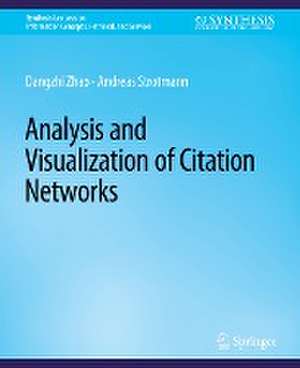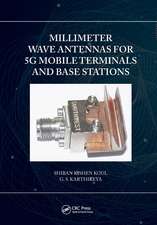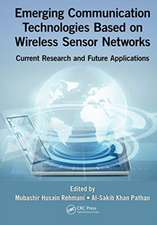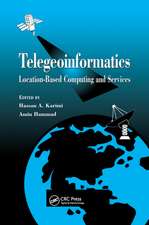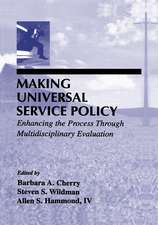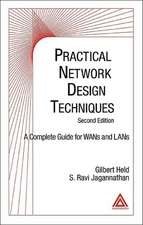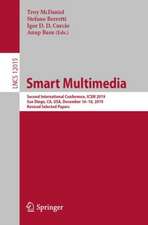Analysis and Visualization of Citation Networks: Synthesis Lectures on Information Concepts, Retrieval, and Services
Autor Dangzhi Zhao, Andreas Strotmannen Limba Engleză Paperback – 11 feb 2015
Din seria Synthesis Lectures on Information Concepts, Retrieval, and Services
- 20%
 Preț: 167.70 lei
Preț: 167.70 lei - 20%
 Preț: 301.96 lei
Preț: 301.96 lei - 20%
 Preț: 165.96 lei
Preț: 165.96 lei - 20%
 Preț: 278.44 lei
Preț: 278.44 lei - 20%
 Preț: 529.64 lei
Preț: 529.64 lei - 20%
 Preț: 276.80 lei
Preț: 276.80 lei - 20%
 Preț: 224.97 lei
Preț: 224.97 lei - 20%
 Preț: 165.44 lei
Preț: 165.44 lei - 20%
 Preț: 177.81 lei
Preț: 177.81 lei - 20%
 Preț: 358.95 lei
Preț: 358.95 lei - 20%
 Preț: 298.43 lei
Preț: 298.43 lei - 20%
 Preț: 237.92 lei
Preț: 237.92 lei - 20%
 Preț: 163.23 lei
Preț: 163.23 lei - 20%
 Preț: 199.72 lei
Preț: 199.72 lei - 20%
 Preț: 167.08 lei
Preț: 167.08 lei - 20%
 Preț: 135.99 lei
Preț: 135.99 lei - 20%
 Preț: 298.64 lei
Preț: 298.64 lei - 20%
 Preț: 176.97 lei
Preț: 176.97 lei - 20%
 Preț: 222.03 lei
Preț: 222.03 lei - 20%
 Preț: 328.79 lei
Preț: 328.79 lei - 20%
 Preț: 225.15 lei
Preț: 225.15 lei - 20%
 Preț: 199.72 lei
Preț: 199.72 lei - 20%
 Preț: 163.23 lei
Preț: 163.23 lei - 20%
 Preț: 304.96 lei
Preț: 304.96 lei - 20%
 Preț: 183.73 lei
Preț: 183.73 lei - 20%
 Preț: 224.18 lei
Preț: 224.18 lei - 20%
 Preț: 163.23 lei
Preț: 163.23 lei - 20%
 Preț: 167.08 lei
Preț: 167.08 lei - 20%
 Preț: 163.23 lei
Preț: 163.23 lei - 20%
 Preț: 227.62 lei
Preț: 227.62 lei - 20%
 Preț: 298.43 lei
Preț: 298.43 lei - 20%
 Preț: 177.62 lei
Preț: 177.62 lei - 20%
 Preț: 137.45 lei
Preț: 137.45 lei - 20%
 Preț: 163.23 lei
Preț: 163.23 lei - 20%
 Preț: 360.47 lei
Preț: 360.47 lei - 20%
 Preț: 177.47 lei
Preț: 177.47 lei - 20%
 Preț: 121.91 lei
Preț: 121.91 lei - 20%
 Preț: 199.72 lei
Preț: 199.72 lei - 20%
 Preț: 327.62 lei
Preț: 327.62 lei - 20%
 Preț: 223.67 lei
Preț: 223.67 lei - 20%
 Preț: 355.44 lei
Preț: 355.44 lei - 20%
 Preț: 289.61 lei
Preț: 289.61 lei - 20%
 Preț: 210.63 lei
Preț: 210.63 lei - 20%
 Preț: 163.23 lei
Preț: 163.23 lei - 20%
 Preț: 177.47 lei
Preț: 177.47 lei - 20%
 Preț: 358.20 lei
Preț: 358.20 lei - 20%
 Preț: 223.67 lei
Preț: 223.67 lei
Preț: 270.99 lei
Preț vechi: 338.74 lei
-20% Nou
Puncte Express: 406
Preț estimativ în valută:
51.86€ • 53.73$ • 43.28£
51.86€ • 53.73$ • 43.28£
Carte tipărită la comandă
Livrare economică 17-24 martie
Preluare comenzi: 021 569.72.76
Specificații
ISBN-13: 9783031011634
ISBN-10: 3031011635
Ilustrații: XVII, 189 p.
Dimensiuni: 191 x 235 mm
Editura: Springer International Publishing
Colecția Springer
Seria Synthesis Lectures on Information Concepts, Retrieval, and Services
Locul publicării:Cham, Switzerland
ISBN-10: 3031011635
Ilustrații: XVII, 189 p.
Dimensiuni: 191 x 235 mm
Editura: Springer International Publishing
Colecția Springer
Seria Synthesis Lectures on Information Concepts, Retrieval, and Services
Locul publicării:Cham, Switzerland
Cuprins
Acknowledgment.- Dedications.-Foundations of Citation Analysis.- Conducting Citation Network Analysis: Steps, Concepts, Techniques, and Tools.- Field Delineation and Data Sources for Citation Analysis.- Disambiguation in Citation Network Analysis.- Visualization of Citation Networks.- Appendix 3.3.- Appendix 5.4.2.- Bibliography.- Author Biographies .
Notă biografică
Dangzhi Zhao is Associate Professor in the School of Library and Information Studies at the University of Alberta, Canada. Dangzhi earned her Ph.D. from the School of Library and Information Studies at The Florida State University, U.S., and her M.S. and B.S. from the Department of Library and Information Science at Peking University, China. Her research and teaching interests are in the areas of information systems, bibliometrics, scholarly communication, and knowledge network analysis and visualization as well as their application in information retrieval and digital libraries. Andreas Strotmann studied Mathematics, Physics, and Linguistics at the University of Cologne, where he also spent many years as a staff scientist supporting computational applications in the sciences and the humanities, including in mathematics, physics, biology, linguistics, education, and publishing. He earned his doctorate in Computer and Information Science from The Florida State University. He has workedas a researcher at the University of Cologne, the University of Alberta, and the GESIS Leibniz Institute for the Social Sciences. For the past decade, he has been working closely with Dangzhi Zhao on improving scientometric methodology.
